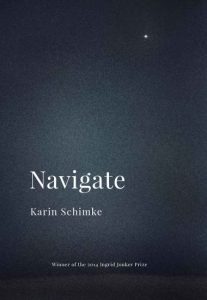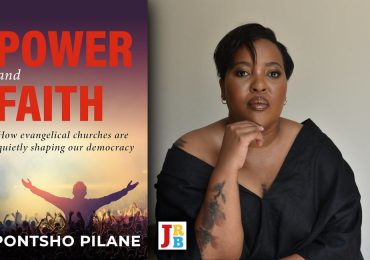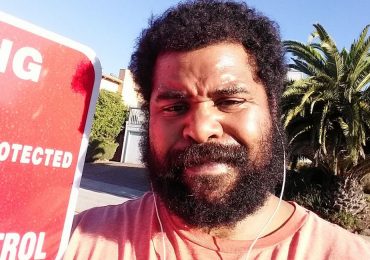‘I cannot un-white my voice, nor can I stop writing.’ Poet, academic and author Antjie Krog interviews Karin Schimke about her second poetry collection, Navigate. Schimke won the 2014 Ingrid Jonker Prize for her debut collection, Bare and Breaking.
 Navigate
Navigate
Karin Schimke
Modjaji Books, 2017
Antjie Krog for The JRB: Writers know the hardest thing to do is to write a better second book, especially if the first one was successful, as yours was. How hard was it for you?
Karin Schimke: Very. The first volume almost wrote itself. By that time, I think my voice had developed. I had always written and published poetry in literary magazines, but had never had any ambition to publish my own collection. It’s as though the poems one day cleared their throat and said: ‘We think we’re ready for something more now.’ Putting together the first collection was easy in the sense that everything felt ready and it was all there, it was a matter of arrangement. Naivety helped too.
After I’d published, I was stunned by what I had done—I wondered how I had dared, who the hell I thought I was. The success of Bare and Breaking did not diminish that feeling. So the second time around there were pressures at play that I didn’t even have a whiff of when I published the first volume. Fortunately I had a fantastic editor in Kobus Moolman. I let him read the first draft without commentary and once he’d read it I said ‘be frank’, and he was. I cut ruthlessly and simply threw stuff out without a second glance. We worked together very well (from my perspective) with strong, no-nonsense editing.
The short answer is: the second time around is very much harder and I have a suspicion that it never gets easier.
The JRB: Your first volume reflects circumstances of deep personal unhappiness; many poets continue to revisit such wounds for the rest of their lives. It seems in Navigate that you moved on, so I have two questions: How hard is it to let go of a ‘wound’, of the literary benefits of a wound? The second question is about the bursts of exhilarated happiness in Navigate, such as:
The blue of sky and pool washed over my head and through me
as I jumped and jumped. The laughter and water,
all the way through me, the splutter of us,
of me and you, me and you in the water.
I was the world’s first and only daughter.
How do they fit into the tough and accurate action of your metaphor: navigation?
Karin Schimke: Writing from extreme emotion—loss, grief, passion, anger—is why poetry exists at all, from a human need to give shape to suffering. A popular idea is that artists and poets are able to do what they do because they suffer more acutely … that their depression and anxiety fuels great art. But not all art is borne from depression and anxiety, or can be endlessly sustained by it. A wound is a wound while it is raw and it can produce spectacular and moving anguish, but most wounds grow over, heal, and are replaced by fading scar tissue. I wouldn’t want to be identified by what appear to be my wounds. It feels limiting, but also stagnated:
[from ‘Do you remember the time when so many people we knew were dying’, in Navigate].I write in these shadows. We drive out of the countryside,
Past the Lazy Daisy Lodge and the catwalk between the koppies.
We milk the air. We travel home. Your beard is longer.
So much to do. So much. My patience bares its teeth.
The JRB: In Navigate you step into a much broader anguish, namely being a white poet within a black context: does one or could one have anything meaningful to say? In ‘Rock fig’, you write: ‘Long after they’ve cut us loose, we’ll clench these places in our root-fists.’
Karin Schimke: It forms part of the ineffable which I am trying, in Navigate, to give form. The issue was ‘the white voice’. Too much of it, too loud, too strident, too ubiquitous, too arrogant. How does one take part in a national dialogue when your voice carries this baggage? How to be an active and dedicated citizen without simply adding to the white noise? I became stuck in a confusing loop of speak/don’t speak. How does one not ‘sound white’—arrogant, presumptuous, righteously indignant, whingy, desperate to signal your virtuousness? On the other hand, it seems extremely wrong-headed to simply abrogate, to bow out of active citizenship.
Various political shifts in 2015 and 2016 made me deeply glad. Change is painful though and certain expressions of change are very uncomfortable. How to rejoice in disruption, and at the same time be horrified by its destructive dark side? I have not necessarily resolved anything, but poetry helped me to become un-stuck, to keep moving, navigating, writing. I cannot un-white my voice, nor can I stop writing. And in this, I feel my way forward carefully, playing blind man’s bluff in a familiar but altered landscape.
The JRB: The volume ties in with several other poets who write about their fathers. Where many poems berate the absence of fathers, your poems speak of how the father himself lives in an absence.
Karin Schimke: The father in this collection is less ‘my father’ than a vehicle for examining something I was thinking about: the question of belonging and identity, of what makes someone ‘a native’—such a powerful and emotive word—and to what extent where you live shapes, complements or detracts from who you are.
The JRB: The word ‘native’ has such a prominent place in this volume and reminds me of Mahmood Mamdani’s inaugural lecture at the University of Cape Town: ‘When Does a Settler Become a Native?’ in which he says: ‘From the point of view of civic citizenship, it is merely a matter of time. […] From the point of view of ethnic citizenship, the answer is: NEVER.’ It is this never that you explore: ‘rubbing / your own sun-browned skin raw against the hemispheres, / always suspecting the existence of home.’ Can you elaborate a little on the two key poems here, ‘Taped Beak’ and ‘Praxis’?
Karin Schimke: This volume was born from paralysis, an inability to carry on as usual when social tremors all around were questioning the ‘normal’ we’d all slid into after 1994. The poem ‘Taped Beak’ was quite literally an exercise in breaking through a dislocation that had un-voiced me. When I say ‘literally’, I mean I forced myself to sit down and write something for seven days in a row to discover why I had developed such an aversion to my own voice, such a horror of words. Those seven small ‘songs’ are printed, apart from small edits, precisely as the exercise unfolded.
Breaking through like that, in an almost violent way, dislodging a stone from my throat—something I’ve never had to do before, since writing is like breathing to me—lead me to understanding what was holding me back. Much of it was simply confusion and being overwhelmed, a lot of it was fear, since I think it’s safe to say that social media has ushered in an era of casual personality annihilation and it really doesn’t take much to provoke that vicious monster. This lead to the writing of ‘Praxis’, which is where the crux is.
The poem ‘Praxis’ transforms the ineffable. For me, poetry has always been about the impossibility of talking, of making work of what is inexpressible. Praxis is a process by which theory becomes practice—an act of moving from thought to action. The word comes from Greek and referred to ‘activity engaged in by free people’ and also ‘action towards changing society’. This underpins my conviction that the right to speak, however hard it is, supports and feeds all engaged and humane human and civic interaction, and that it comes with a duty to listen (an often ignored corollary). So this poem immerses itself directly in my observations around the time of Rhodes Must Fall. It’s about revolution, its patterns and frustrations, and the firm decision not to allow myself to be spoken for by others or by my outer identity:
I give my mouth to no one.
I am the ears of everyone
and of myself. When you
shout, shells tilt. We nod […]I will not staunch you
I listen for a half beat,
a breath, and whisper back
the whispers of waiting
gales. Pen-ink my voice
and silent so; willed to white,
whitened to bone. And flaccid.
It ends with a more private, relational metaphor about the upending of a power relationship. The relationship itself cannot be wished away. It’s about the possibility, or not, of two parties in confused power relations who are forced to live with one another, tolerate one another and who, confusingly, both love and hate one another.
The JRB: Your first volume won the Ingrid Jonker Prize, which alternates between Afrikaans and English debut volumes, and which comes with a small sum of money. But that seems to me to be the only annual poetry prize in South Africa available to poets writing in English, while Afrikaans poets can also win the Elisabeth Eybers Poetry Prize and the ATKV Prys vir Poësie every year—both of which come with considerable money. What does a prize do for a poet?
Karin Schimke: The prize was nothing more than the substance it gave to the adjective ‘award-winning’, and the only practical advantage then is that to write ‘award-winning’ before one’s name might act as a key to other opportunities and possibilities.
A prize is a warm affirmation, a sense that you’re not operating in a complete vacuum, and a useful tag, and I am enormously grateful for the doors it has opened for me. But the Ingrid Jonker is not a prize that comes with much money. I make more money writing one article than I did from getting that prize.
The JRB: But it does open doors, important doors to survival …
Karin Schimke: It would be enormously helpful to South African poetry if there were indeed more, and more generous, prizes given for it, because it would help to support an important aspect of our cultural store by rewarding people who are dedicated to an art form that, unlike painting, or music-making, is never going to make anyone a living.
The JRB: Somebody once suggested to me that some awards for English writing, such as the CNA Literary Award, disappeared in the ‘new dispensation’ because the divide between poets of the stage and poets of the page became too political for funders’s comfort. Do you think there is any truth in that? (Douglas Livingstone, for example, received the Guinness Poetry Prize [1965], the Cholmondeley Poetry Prize [1970] and the CNA Literary Award [1985].)
There was once the DaimlerChrysler Prize for South African poetry, which Gabeba Baderoon won in 2005, and there are still the English Academy’s various awards and the South African Literature Awards for poetry. I’m not sure if the explanation you’ve heard for the dearth of awards for English poetry as being ‘too political’ is right. All prizes—indeed all publishing decisions, bestseller lists, marketing bonanzas, anything at all to do with publishing—is political. My cynicism suggests that the real reason is that people don’t care. Poetry is not seen as important, relevant or interesting. You’d be hard-pressed to find anyone who reviews English poetry in South Africa and, until Koleka Putuma published her collection Collective Amnesia after years of doing the hard yards on the spoken-word scene, the best sales anyone seemed to hope for was about three hundred copies. Anyway, I think Putuma has shown that the chasm between stage and page is not as unbridgeable as everyone thinks.
The JRB: Let me conclude in these times of drought with one of your poems linking our bodily selves to water and an ecstatic disintegration, ‘January swim’:
The mountains are still cooling.
The night was not long enough.
The morning bends over us. From
this rock I can slip almost soundlessly
into amber. I own this body as though
I am its first citizen. To the middle then,
to command this day from dam’s belly.
I turn my face up to the lavender-hello and drift,
hairbeams streaming. Look, Sun.
An undone knot. A drifting speck.





